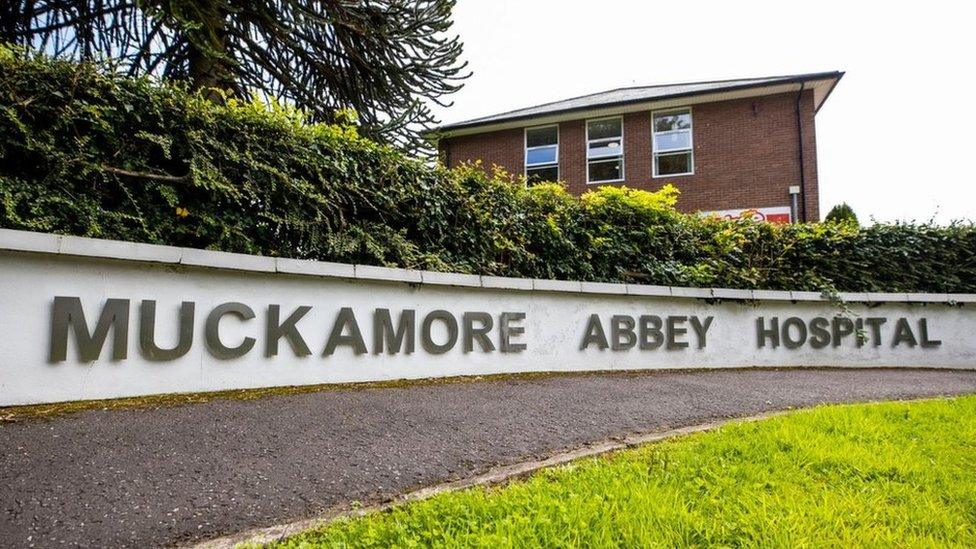Muckamore Abbey Hospital: Staff 'traumatised' by abuse investigations
- Published

The facility is at the centre of the UK's biggest ever police investigation into the abuse of vulnerable adults
Staff at Muckamore Abbey Hospital were left stressed and traumatised by investigations into abuse at the facility, a public inquiry has heard.
Cahal McKervey is a former senior nurse who came out of retirement to work there, after hearing about low staffing levels and difficult conditions for remaining staff.
He volunteered to work at Muckamore two days a week, between 2019 and 2022.
His role was mainly an administrative one.
On Tuesday, he told the inquiry that there was "good support" from leadership. But it became clear that staff were "stressed and traumatised" by the reporting of abuse investigations on the news - and the reporting of claims by the media.
The public inquiry is examining allegations of abuse at Muckamore Abbey Hospital.
It is run by the Belfast Health Trust and provides facilities for adults with special needs.
A major police investigation began in 2017 after allegations of ill-treatment began to emerge.
'Level of assaults'
At the public inquiry on Tuesday, Mr McKervey was asked what support was available for staff. He said counsellors were put in place on site and a separate staff care service was also available.
He said very few learning disability nurses worked there at the time as most had left or been placed on precautionary suspension, pending investigations by the health trust and PSNI.
"It was very difficult recruiting," Mr McKervey said.
Many staff members were agency nurses brought over from England, he told the inquiry.
He said they were from diverse ethnic backgrounds and had reported racial abuse from patients.
Amid publicity around the ongoing investigations by the health trust and police, he said that few applications were submitted for roles, particularly those of senior nurses and learning disability nurses. The deficit was often filled by agency nurses.
Mr McKervey said he was "taken aback" by the level of assaults in the hospital - about 20 a week.
"I haven't previously seen that," he said. "Incidents happened most days.
"It was difficult for staff to manage. It was having an impact on staff morale."
He said incidents happened between patients, or patients on staff.
Apart from one incident which was reported, he said he did not see any abuse of patients, poor care, or anything he was uncomfortable with.
"I was impressed by what I saw," he told the inquiry.
"I felt staff were not too reactive. I felt staff knew the patients well."

The hospital provides treatment for people with severe learning disabilities
On Tuesday, the inquiry chair, Tom Kark KC, also warned some members of staff that he could force them to give a statement to the inquiry.
He said that a number have been contacted, and some have so far avoided responding.
If they refuse, he can compel them to come forward under a Section 21 notice.
"I expect witnesses who have been identified by the inquiry to make a statement, to do so," he said.
"And if we face refusal, for whatever reason, I will have to consider the use of Section 21 notices in order to compel the provision of a statement."
The inquiry has now finished its evidence for 2023. It heard from 136 witnesses.
It is expected that more witnesses will give evidence to the inquiry when it resumes next February.
- Published25 September 2023

- Published22 September 2022

- Published20 September 2023

- Published20 June 2023
